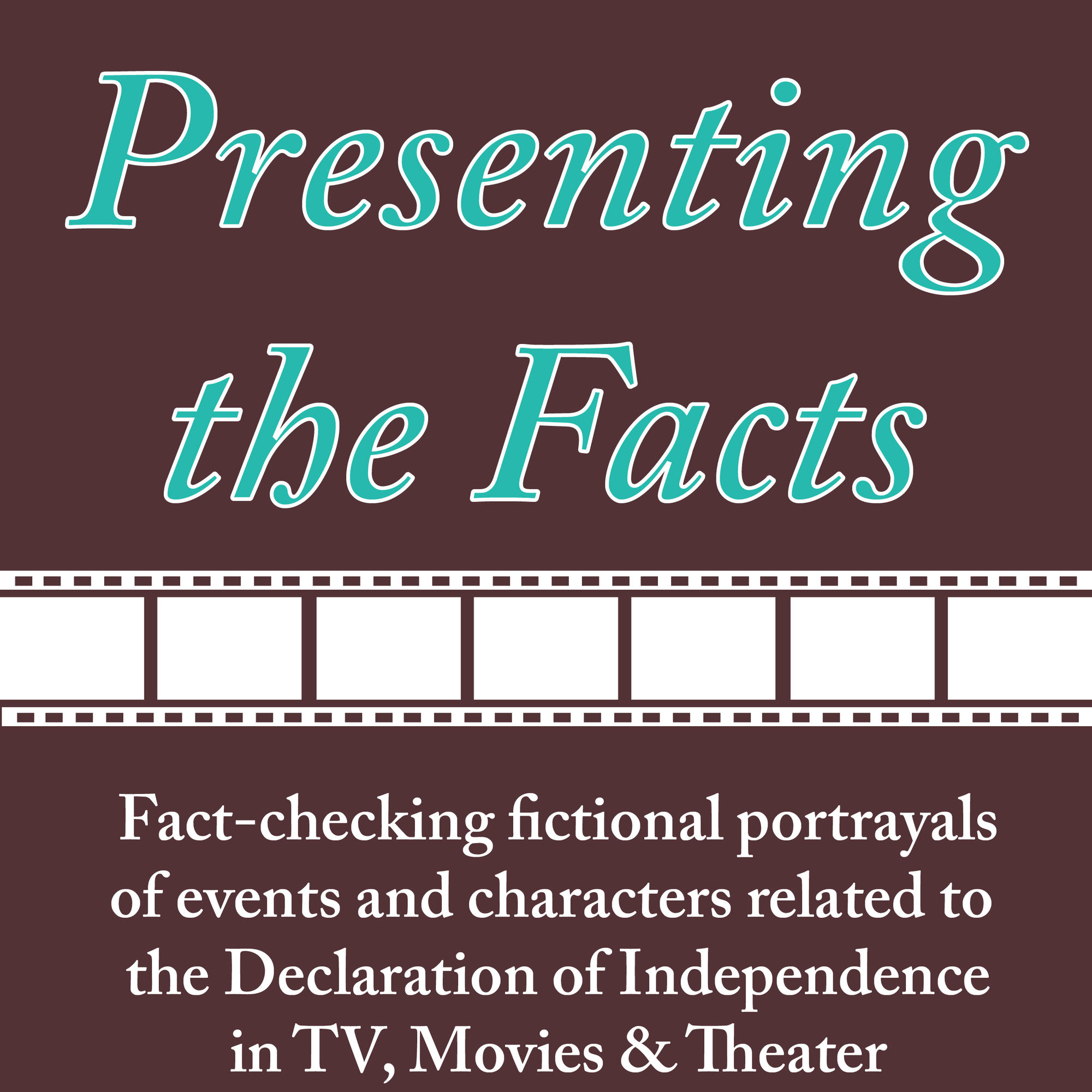 In this edition of "Presenting the Facts", we explore the 1972 movie adaptation of the musical 1776. The concept, music, and lyrics were by Sherman Edwards, and the book was written by Peter Stone. The musical opened on March 16, 1969 and closed on February 13, 1972. The movie, which was directed by Peter H. Hunt and produced by Jack L. Warner, was released in November of that year.
In this edition of "Presenting the Facts", we explore the 1972 movie adaptation of the musical 1776. The concept, music, and lyrics were by Sherman Edwards, and the book was written by Peter Stone. The musical opened on March 16, 1969 and closed on February 13, 1972. The movie, which was directed by Peter H. Hunt and produced by Jack L. Warner, was released in November of that year.
With the current success of Hamilton: An American Musical, the concept of a musical based on the founding generation makes complete sense. But when 1776 first opened on Broadway, it was (pardon the pun) revolutionary. Sherman Edwards was a former history teacher who merged his knowledge of early American history with his talent for songwriting to create a musical focused on the Continental Congress in the months leading up to July 4, 1776.
The libretto for 1776 includes a Historical Note by the Authors, which begins as follows: "The first question we are asked by those who have seen—or read—1776 is invariably: 'Is it true? Did it really happen that way?' The answer is: Yes." Edwards and Stone list "those elements of [the] play that have been taken, unchanged and unadorned, from documented fact," followed by dramatic changes that fall into one of five categories: "things altered, things surmised, things added, things deleted, and things rearranged." We use Edwards' descriptions of facts and fictions as our guide, adding commentary and corrections along the way. So, sit down, open up a window, and learn about what's fact and what's fiction in 1776.
 Things Deleted: "There is, after all, a limit to an audience's ability to assimilate (and keep separate) a large number of characters, as well as the physical limits of any given stage production. For this reason several of the lesser known (and least contributory) Congressmen were eliminated altogether, and in a few cases two or more were combined into a single character. James Wilson, for example, contains a few of the qualities of his fellow Pennsylvanian, John Morton. And John Adams is, at times, a composite of himself and his cousin Sam Adams" - Sherman Edwards
Things Deleted: "There is, after all, a limit to an audience's ability to assimilate (and keep separate) a large number of characters, as well as the physical limits of any given stage production. For this reason several of the lesser known (and least contributory) Congressmen were eliminated altogether, and in a few cases two or more were combined into a single character. James Wilson, for example, contains a few of the qualities of his fellow Pennsylvanian, John Morton. And John Adams is, at times, a composite of himself and his cousin Sam Adams" - Sherman Edwards
Here is the Cast of Characters in 1776's version of the Continental Congress:
President: John Hancock
New Hampshire: Dr. Josiah Bartlett
Massachusetts: John Adams
Rhode Island: Stephen Hopkins
Connecticut: Roger Sherman
New York: Lewis Morris, Robert Livingston
New Jersey: Reverend John Witherspoon
Pennsylvania: Benjamin Franklin, John Dickinson, James Wilson
Delaware: Caesar Rodney, Colonel Thomas McKean, George Read
Maryland: Samuel Chase
Virginia: Richard Henry Lee, Thomas Jefferson
North Carolina: Joseph Hewes
South Carolina: Edward Rutledge
Georgia: Dr. Lyman Hall
The only fully-represented delegation is Delaware; every other colony/state is represented by far fewer men than in reality. For example, Pennsylvania's delegation is just three men: the pro-independence vote (Franklin), the anti-independence vote (Dickinson), and the undecided vote (James Wilson). This is an oversimplification of the actual delegation in Congress in late June: the pro-independence votes (Franklin and James Wilson), the anti-independence votes (Dickinson, Charles Humphreys, Thomas Willing, and Robert Morris), and the undecided vote (John Morton). On July 2nd, Morton decided in favor of independence, and Morris and Dickinson abstained from voting, turning Pennsylvania from a "nay" to a "yea". To find out exactly how many delegates were in Congress in the summer of 1776, see another musically-inspired blog: No John Trumbull.
 Things Surmised: "It is unknown... whether Richard Henry Lee was persuaded to go to the Virginia House of Burgesses in order to secure a motion of independence that could be introduced in Congress, or if he volunteered on his own. Certainly Adams was getting nowhere with his own efforts..." - Sherman Edwards
Things Surmised: "It is unknown... whether Richard Henry Lee was persuaded to go to the Virginia House of Burgesses in order to secure a motion of independence that could be introduced in Congress, or if he volunteered on his own. Certainly Adams was getting nowhere with his own efforts..." - Sherman Edwards
Adams and Richard Henry Lee were among the most vocal supporters of independence in Congress, so it is not surprising that the resolution to declare independence came from one of these men. In fact, when Lee brought his resolution to Congress, it was seconded by Adams. However, Adams and Franklin never sent Lee to the Virginia House of Burgesses, as they do in 1776. In fact, Lee didn't go to Virginia in May 1776 at all. His June 7 resolution comes from instructions that were sent to him and his fellow delegates by the House of Burgesses on May 15.
Click to watch a clip of "The Lees of Old Virginia"
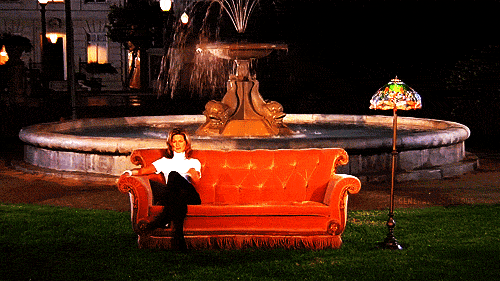 A few fun facts about "The Lees of Old Virginia":
A few fun facts about "The Lees of Old Virginia":
The water fountain is also seen during the opening credits of Friends.
Lee mentions General Lighthorse Harry Lee, but that Lee didn't earn his nickname until 1778.
Other FFVs (First Families of Virginia) include the Braxtons, Carters, Harrisons, Jeffersons, Nelsons, and Washingtons.
 Fact: "Caesar Rodney of Delaware, suffering from skin cancer, never appeared in public without a green scarf wrapped around his face" - Sherman Edwards
Fact: "Caesar Rodney of Delaware, suffering from skin cancer, never appeared in public without a green scarf wrapped around his face" - Sherman Edwards
It is true that Rodney had skin cancer on his face and wore a scarf to cover it, though whether it was a green scarf is unconfirmed. It is worth noting that Rodney was actually taller than the actor who portrays him in the movie version of 1776 (William Hansen); John Adams described Rodney in 1774 as "the oddest looking Man in the World... tall—thin and slender as a Reed—pale—his Face is not bigger than a large Apple. Yet there is Sense and Fire, Spirit, Wit and Humour in his Countenance."
 Fact: "Ben Franklin's illegitimate son William was Royal Governor of New Jersey until he was arrested, in June 1776, and exiled to Connecticut" - Sherman Edwards
Fact: "Ben Franklin's illegitimate son William was Royal Governor of New Jersey until he was arrested, in June 1776, and exiled to Connecticut" - Sherman Edwards
William Franklin was the only son of Benjamin Franklin to survive to adulthood, born to an unidentified woman around 1730 and raised by Benjamin and his common-law wife Deborah. William had his own illegitimate son, William Temple Franklin, while living in London in 1762. The following year, William Franklin was appointed as Royal Governor of New Jersey; he would be the last colonial governor of New Jersey. As the relationship between the colonies and Great Britain strained, so too did the relationship between Benjamin, who supported independence, and William, who was a Loyalist. In January 1776, William Franklin was placed under house arrest, and in mid-June, the Provincial Congress of New Jersey ordered the formal arrest of Governor Franklin as "an enemy to the liberties of this country." He was imprisoned in Connecticut for two years. Though Benjamin Franklin's relationship with William never recovered, he remained quite close with his grandson, Temple, who served as his secretary.
 Things Added: "The tally board used throughout the play to record each vote did not exist in the actual chamber in Philadelphia. It has been included in order to clarify the positions of the thirteen colonies at any given moment, a device allowing the audience to follow the parliamentary action without confusion." - Sherman Edwards
Things Added: "The tally board used throughout the play to record each vote did not exist in the actual chamber in Philadelphia. It has been included in order to clarify the positions of the thirteen colonies at any given moment, a device allowing the audience to follow the parliamentary action without confusion." - Sherman Edwards
 Fact: "Rhode Island's Stephen Hopkins, known to his colleagues as 'Old Grape and Guts' because of his fondness for distilled refreshment, always wore his round black, wide-brimmed Quaker's hat in the chamber" - Sherman Edwards
Fact: "Rhode Island's Stephen Hopkins, known to his colleagues as 'Old Grape and Guts' because of his fondness for distilled refreshment, always wore his round black, wide-brimmed Quaker's hat in the chamber" - Sherman Edwards
In his autobiography, John Adams recorded that Hopkins' "Custom was to drink nothing all day nor till Eight O Clock, in the Evening, and then his Beveredge was Jamaica Spirit and Water. ... Hopkins never drank to excess, but all he drank was immediately not only converted into Wit, Sense, Knowledge and good humour, but inspired Us all with similar qualities."
 Fact: "None of the five members of this committee wanted the assignment of actually writing the Declaration, and all of them begged off for one personal reason or another" - Sherman Edwards
Fact: "None of the five members of this committee wanted the assignment of actually writing the Declaration, and all of them begged off for one personal reason or another" - Sherman Edwards
It is true that Thomas Jefferson, John Adams, Benjamin Franklin, Roger Sherman, and Robert R. Livingston made up the Committee tasked with drafting the Declaration of Independence. There is no evidence that Sherman or Livingston were ever considered for the role of principal author, as they are in the song "But, Mr. Adams". We also know that Robert R. Livingston did not leave for the stork (which conveniently rhymes with "York"), but for the New York Convention. Edwards drew inspiration from Adams' autobiography, which describes his reasons for choosing Jefferson to draft the document.
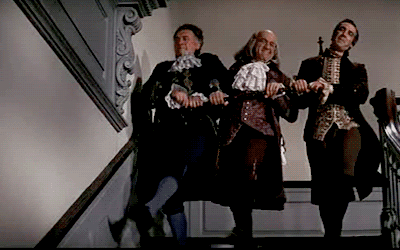
 Fact: "Jefferson was, besides being an author, lawyer, farmer, architect, and statesman, a fine violinist" - Sherman Edwards
Fact: "Jefferson was, besides being an author, lawyer, farmer, architect, and statesman, a fine violinist" - Sherman Edwards
Jefferson learned to play the violin when he was young, and it believed that he used that talent to woo Martha, who sang and played the harpsichord. A Hessian officer who visited Monticello in 1780 wrote, "As all Virginians are fond of music, he is particularly so. You will find in his House an Elegant Harpsichord Piano forte and some Violins. The latter he performs well upon himself, the former his Lady touches very skilfully and who, is in all Respects a very agreable Sensible and Accomplished Lady."
Click to watch a clip of "He Plays the Violin"
 Things Added: "While it is true that Jefferson missed [Martha] to distraction, more than enough to effect an unscheduled reunion, it is believed that he journeyed to Virginia to see her. The license of having her come to see him, at Adams' instigation, stemmed from our desire to show something of the young Jefferson's personal life without destroying the unity of setting." - Sherman Edwards
Things Added: "While it is true that Jefferson missed [Martha] to distraction, more than enough to effect an unscheduled reunion, it is believed that he journeyed to Virginia to see her. The license of having her come to see him, at Adams' instigation, stemmed from our desire to show something of the young Jefferson's personal life without destroying the unity of setting." - Sherman Edwards
One of the most notable fictions in 1776 is Martha Jefferson's visit to Philadelphia. Thomas and Martha are depicted as newlyweds, madly in love; in actuality, the Jeffersons had been married for four years. Thomas longed to return home to his wife, but for a more dire reason. Martha never visited Philadelphia and was certainly in no condition to travel in the summer of 1776, having just suffered a miscarriage. Though Thomas likely destroyed their correspondence after Martha's death in 1782, we know from his other writings that Martha's health weighed on him in June and July 1776. On July 29, Jefferson wrote to Richard Henry Lee, imploring him to return to Philadelphia to serve in the Virginia delegation: "For god's sake, for your country's sake, and for my sake, come. I receive by every post such accounts of the state of Mrs. Jefferson's health, that it will be impossible for me to disappoint her expectation of seeing me at the time I have promised... I am under a sacred obligation to go home."
Just as John Adams begs Abigail to "Come to Philadelphia", the real Adams was anxious to see his family, or better yet bring them to Philadelphia. In May 1776, he wrote to Abigail, "I have some Thoughts of petitioning the General Court for Leave to bring my Family, here. I am a lonely, forlorn, Creature here."
 Things Added: "Adams, Franklin, and Chase are shown leaving for New Brunswick, New Jersey, for an inspection of the military. This particular trip did not actually take place, though a similar one was made to New York after the vote on independence, during which Adams and Franklin had to share a single bed in an inn." - Sherman Edwards
Things Added: "Adams, Franklin, and Chase are shown leaving for New Brunswick, New Jersey, for an inspection of the military. This particular trip did not actually take place, though a similar one was made to New York after the vote on independence, during which Adams and Franklin had to share a single bed in an inn." - Sherman Edwards
For this imagined trip, Edwards incorporated details from the trip that Adams, Franklin, and Edward Rutledge made to Staten Island in September 1776 for their summit with Lord Howe. On September 9, Adams recorded that, "At Brunswick, but one bed could be procured for Dr. Franklin and me, in a Chamber little larger than the bed, without a Chimney and with only one small Window."
 Fact: Debate over the Declaration included the deletion of "a strong condemnation of that 'peculiar institution' slavery (accusing King George III of waging 'cruel war against human nature itself, violating its most sacred rights of life and liberty in the persons of a distant people who never offended him, carrying them into slavery in another hemisphere...") which called for its abolition. This paragraph was removed to placate and appease the Southern colonies and to hold them in the Union." - Sherman Edwards
Fact: Debate over the Declaration included the deletion of "a strong condemnation of that 'peculiar institution' slavery (accusing King George III of waging 'cruel war against human nature itself, violating its most sacred rights of life and liberty in the persons of a distant people who never offended him, carrying them into slavery in another hemisphere...") which called for its abolition. This paragraph was removed to placate and appease the Southern colonies and to hold them in the Union." - Sherman Edwards
Jefferson's Notes of Proceedings in the Continental Congress explains that, "the clause... reprobating the enslaving the inhabitants of Africa, was struck out in complaisance to South Carolina & Georgia, who had never attempted to restrain the importation of slaves, and who on the contrary still wished to continue it. our Northern brethren also I believe felt a little tender under those censures; for tho' their people have very few slaves themselves yet they had been pretty considerable carriers of them to others." Edwards puts these words into Edward Rutledge's mouth in the song "Molasses to Rum" (see below).
 Fact: "The New York delegation abstained on many votes, including the final vote on independence" - Sherman Edwards
Fact: "The New York delegation abstained on many votes, including the final vote on independence" - Sherman Edwards
New York, courteously, abstained from the vote for independence on July 2nd and the vote confirming the Declaration of Independence on July 4th.
 Fact: "The deadlock existing within the Delaware delegation of the mortally ill Caesar Rodney, who, in great pain, had ridden all night from Dover, a distance of some eighty miles, arriving just in time to save the motion on independence from being defeated." - Sherman Edwards
Fact: "The deadlock existing within the Delaware delegation of the mortally ill Caesar Rodney, who, in great pain, had ridden all night from Dover, a distance of some eighty miles, arriving just in time to save the motion on independence from being defeated." - Sherman Edwards
It is true that Rodney rode through the night in order to arrive in Philadelphia just in time to break Delaware's one-to-one vote on independence. But Adams did not tell Thomas McKean to "ride down into Delaware and fetch back Caesar Rodney!", as he does in 1776.
 Things Altered: The "Declaration, though reported back to Congress for amendments and revisions prior to the vote on independence on July 2, was not actually debated and approved until after that vote. However, had this schedule been preserved in the play, the audience's interest in the debate would already have been spent." Additionally, the "Declaration was not signed on July 4, 1776... The greatest number signed on August 2..." - Sherman Edwards
Things Altered: The "Declaration, though reported back to Congress for amendments and revisions prior to the vote on independence on July 2, was not actually debated and approved until after that vote. However, had this schedule been preserved in the play, the audience's interest in the debate would already have been spent." Additionally, the "Declaration was not signed on July 4, 1776... The greatest number signed on August 2..." - Sherman Edwards
After using the element of time to show how slowly Congress was moving in June 1776, it makes sense that July 2nd, July 4th, and August 2nd were conflated, so that the play can quickly transition from debating independence itself to debating the document, to signing the document. The actors' final pose is meant to mirror Robert Edge Pine's unfinished painting, "Congress Voting Independence" (ca. 1784-1788) — not the more famous "Declaration of Independence" painting by John Trumbull.
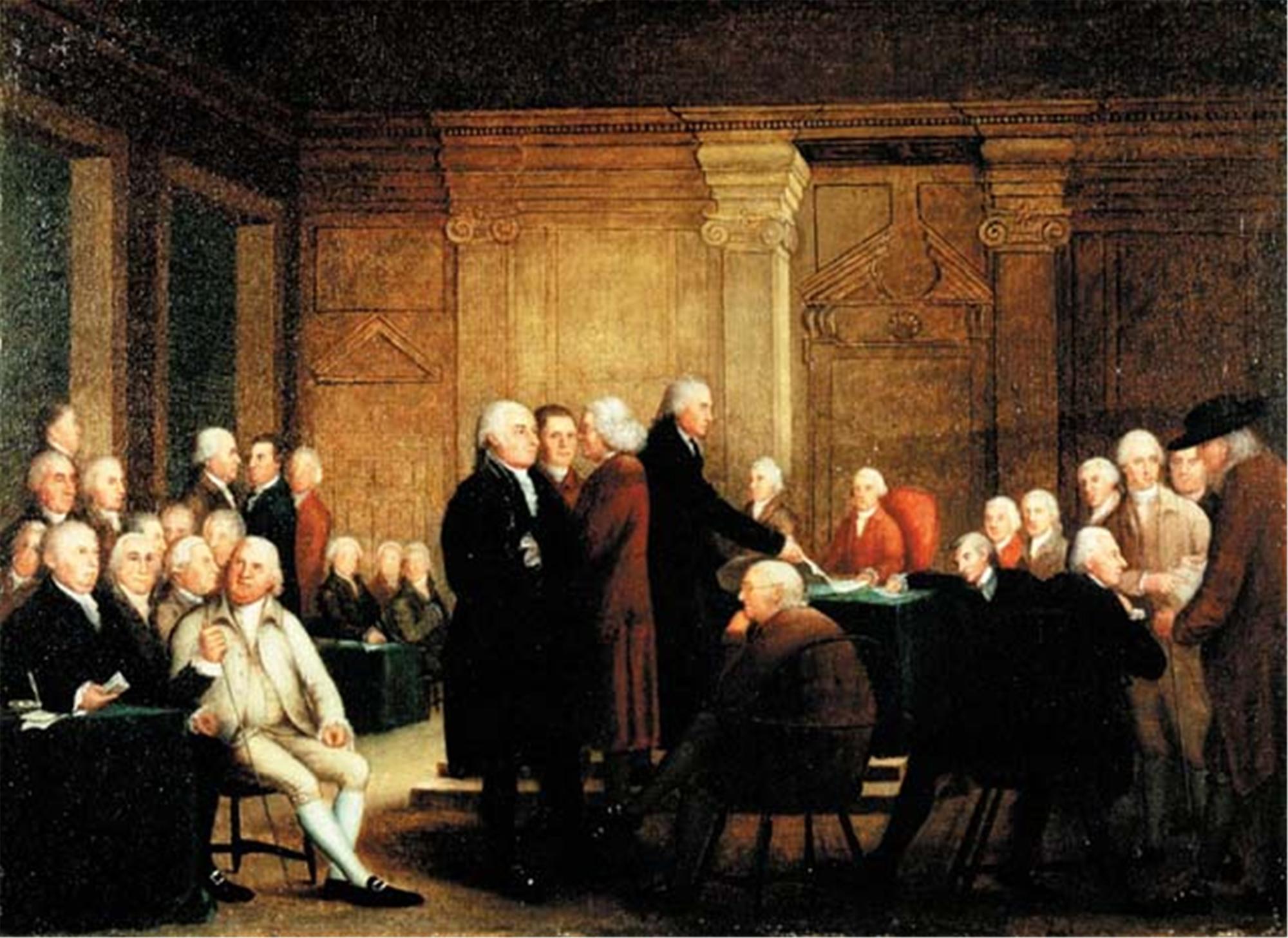
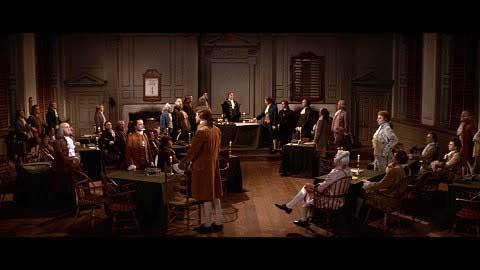
 Fact: "John Dickinson of Pennsylvania, the leader of the anti-independence forces (desiring reconciliation with England), refused to sign the Declaration, a document he felt he could not endorse. But, asserting a fidelity to America, he left the Congress to enlist in the Continental Army as a private—though he was entitled to a commission—and served courageously with the Delaware Militia. Some years later he was appointed to the Constitutional Convention, representing Delaware, and returned to Philadelphia to contribute greatly to the writing of that extraordinary document, the United States Constitution." - Sherman Edwards
Fact: "John Dickinson of Pennsylvania, the leader of the anti-independence forces (desiring reconciliation with England), refused to sign the Declaration, a document he felt he could not endorse. But, asserting a fidelity to America, he left the Congress to enlist in the Continental Army as a private—though he was entitled to a commission—and served courageously with the Delaware Militia. Some years later he was appointed to the Constitutional Convention, representing Delaware, and returned to Philadelphia to contribute greatly to the writing of that extraordinary document, the United States Constitution." - Sherman Edwards
Dickinson was absent from the vote on July 2nd, and did not sign the Declaration of Independence. Within days of July 4th, Dickinson was serving as Brigadier General in the Pennsylvania Associators, the local militia.
 Things Surmised: "The final logical conjecture we made concerned the discrepancy between the appearance of the word 'inalienable' in Jefferson's version of the Declaration and its reappearance as 'unalienable' in the printed copy that is now in universal use. This could have been a misprint, but it might, too, have been the result of interference by Adams... There is no doubt that the meddlesome 'Massachusettensian,' a Harvard graduate, was not above speaking to Mr. Dunlap, the printer." - Sherman Edwards
Things Surmised: "The final logical conjecture we made concerned the discrepancy between the appearance of the word 'inalienable' in Jefferson's version of the Declaration and its reappearance as 'unalienable' in the printed copy that is now in universal use. This could have been a misprint, but it might, too, have been the result of interference by Adams... There is no doubt that the meddlesome 'Massachusettensian,' a Harvard graduate, was not above speaking to Mr. Dunlap, the printer." - Sherman Edwards
In The Declaration of Independence: The Evolution of the Text, Julian Boyd explains the change from inalienable to unalienable as follows: "This alteration may possibly have been made by the printer rather than at the suggestion of Congress. The Rough Draft reads 'inalienable' without any indication of change made in Congress. None of the copies made by Jefferson has the form 'unalienable'... The copy printed by Dunlap and inserted in the Rough Journal of Congress is the first official copy that has the form 'unalienable,' though it will be noticed that the copy taken by John Adams used that spelling. Both forms were apparently current in the eighteenth century but, since this is the only change in Jefferson's spelling made by Congress—or by any of the Committee—and since none of Jefferson's copies indicate a change made by Congress, it may possibly be that we are indebted to John Dunlap, or a faulty proofreader, for this one." Combine this analysis with the likelihood of one of the members of the Committee of Five supervising Dunlap's first printing (as they were instructed to do by Congress), and you get John Adams working with John Dunlap to insert his preferred spelling. But all of this is conjecture, and as Boyd notes, both spellings were technically correct at the time.
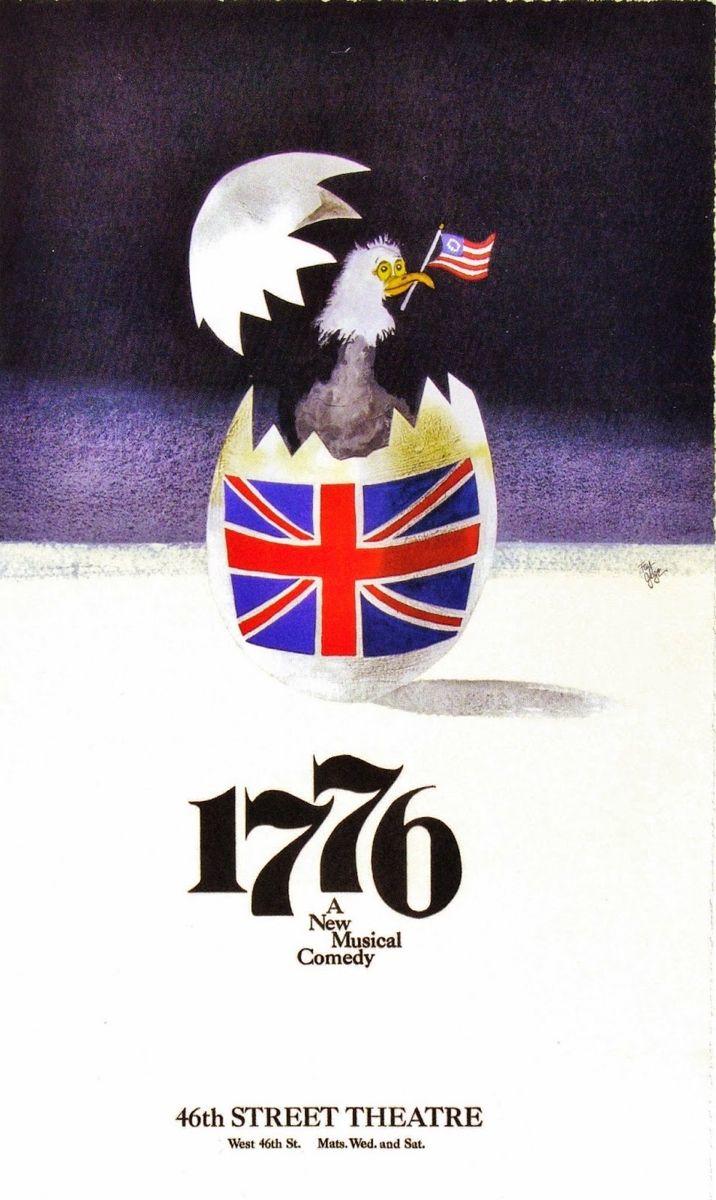 A few more corrections and fun facts:
A few more corrections and fun facts:
"The Egg" was actually a last minute addition to the play. The official poster had already been created, and Edwards took inspiration from the artwork for a new, lighter number in Act 2.
Washington's Dispatch about Lewis Morris
Near the end of Act 2, a dispatch from George Washington sways Lewis Morris of New York to sign the Declaration even though New York had, courteously, abstained from voting for it. In reality, Lewis Morris had left Congress sometime in June and was serving as brigadier general of the Westchester County militia in New York in July 1776. He didn't sign the Declaration until after he returned to the Continental Congress in September. It is true that Morris's estate, Morrisania, was vandalized by the British after the Battle of Long Island, and had to be rebuilt after the war. It is also true that Morris's children, specifically his three oldest boys, fought in the Revolution.
William Daniels is John Adams.
No, not literally. But Daniels, arguably the star of 1776, has portrayed John Adams and his family members multiple times. After 1776, he played John Adams again in The Rebels in 1979. His first television appearance was as a young John Quincy Adams in A Woman for the Ages in 1952. In 1976, he played an older John Quincy Adams in the PBS miniseries The Adams Chronicles. He also played Samuel Adams in the 1978 TV movie, The Bastard.
There are several references to 1776 in Daniels' later work. In an episode of St. Elsewhere set in Philadelphia, his character, Dr. Marc Craig, walks past Independence Hall and remarks, "I don't know what it is about this place, every time I'm here, I feel like singing and dancing." Daniels' character on Boy Meets World, Mr. Feeny, teaches at John Adams High School in Philadelphia.
Saltpetre and Pins
John and Abigail really did correspond about these products. In a letter dated April 5, 1776 and mailed with the "Remember the Ladies" letter of March 31st, Abigail wrote, "You inquire whether I am making Salt peter. I have not yet attempted it, but after soap making believe I shall make the experiment." Similarly, in July 1775, Abigail wrote, "Not one pin is to be purchased for love nor money".

How does the dialogue in 1776 compare to the real life speeches and writings of these characters?
John Hancock, Scene 1: "I now call the Congress' attention to the petition of Mr. Melchior Meng, who claims twenty dollars' compensation for his dead mule. It seems the animal was employed transporting luggage in the service of the Congress."
"The Committee of Claims reported, that there is due, ... To Melchior Meng, for twenty one days hire of this waggon and horses, carrying money to Virginia, the sum of £15" - Journals of the Continental Congress, 6 June 1776
Abigail and John Adams, "Yours, Yours, Yours": "I am, as I ever was, and ever shall be—Yours... Yours... Yours..."
"I am as I ever was and ever shall be Yours, Yours, Yours" - John Adams, Letter to Abigail Adams, 16 February 1780
Abigail Adams, "Yours, Yours, Yours": "I live like a nun in a cloister, / Solitary, celibate, I hate it."
"I have been like a nun in a cloister ever since you went away, have not been into any other house than my Fathers and Sisters, except once to Coll. Quincys." - Abigail Adams, Letter to John Adams, 12 November 1775
John Adams, Scene 4: "It doesn't matter. I won't appear in the history books, anyway—only you. Franklin did this, Franklin did that, Franklin did some other damned thing. Franklin smote the ground, and out sprang George Washington, fully grown and on his horse. Franklin then electrified him with his miraculous lightning rod, and the three of them—Franklin, Washington, and the horse—conducted the entire Revolution all by themselves."
"The History of our Revolution will be one continued Lye from one End to the other. The Essence of the whole will be that Dr Franklins electrical Rod, Smote the Earth and out Spring General Washington. That Franklin electrified him with his Rod—and thence forward these two conducted all the Policy Negotiations Legislation and War." - John Adams, Letter to Benjamin Rush, 4 April 1790
George Washington (Dispatch read by Charles Thomson), Scene 5: "Oh, how I wish I had never seen the Continental Army. I would have done better to retire to the back country and live in a wigwam."
"I have often thought how much happier I should have been, if, instead of accepting of a command under such Circumstances I had taken my Musket upon my Shoulder & enterd the Ranks, or, if I could have justified the Measure to Posterity, & my own Conscience, had retir'd to the back Country, & lived in a Wig-wam..." - George Washington, Letter to Lieutenant Colonel Joseph Reed, 14 January 1776
Edward Rutledge, Scene 7: "Then what's that I smell floatin' down from the North—could it be the aroma of hy-pocrisy? For who holds the other end of that filthy purse-string, Mr. Adams? Our northern brethren are feelin' a bit tender toward our slaves. They don't keep slaves, no-o, but they're willin' to be considerable carriers of slaves—to others! They are willin', for the shillin'..."
"our Northern brethren also I believe felt a little tender under those censures; for tho' their people have very few slaves themselves yet they had been pretty considerable carriers of them to others." - Thomas Jefferson, Notes of Proceedings in the Continental Congress
John Adams, "Is Anybody There?": "I see / Fireworks! / I see the Pageant and Pomp and Parade! / I hear the bells ringing out / I hear the cannons' roar!"
"It ought to be solemnized with Pomp and Parade, with Shews, Games, Sports, Guns, Bells, Bonfires and Illuminations from one End of this Continent to the other from this Time forward forever more." - John Adams, Letter to Abigail Adams, 3 July 1776
John Adams, "Is Anybody There?": "Through all the gloom, / Through all the gloom, I can / See the rays of ravishing light and / Glory!"
"Yet through all the Gloom I can see the Rays of ravishing Light and Glory." - John Adams, Letter to Abigail Adams, 3 July 1776
John Adams: "Good God!"
"Good God! where are the Rights of English Men! where is the spirit, that once exalted the souls of Britons and emboldened their [faces] to look even Princes and Monarchs in the face." - John Adams, Draft of an essay, ca. January 1761
"Good God! What shall We say of human Nature? What shall We say of American Patriots? or rather what will the World Say?" - John Adams, Letter to Charles Lee, 13 October 1775
"Good God! Is this a public Man sitting in Judgment on Nations? And has the American People so little Judgment, Taste and Sense to endure it?" - John Adams, Letter to Abigail Adams Smith, 26 September 1802
"Good God! Is a President of the U.S to be Subject to a private Action of every Individual? This will Soon introduce the Axiom that a President can do no wrong; or another equally curious that a President can do no right." - John Adams, Letter to Thomas Jefferson, 1 May 1812
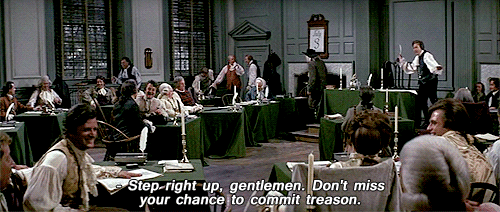
By Emily Sneff
Last | Presenting the Facts

